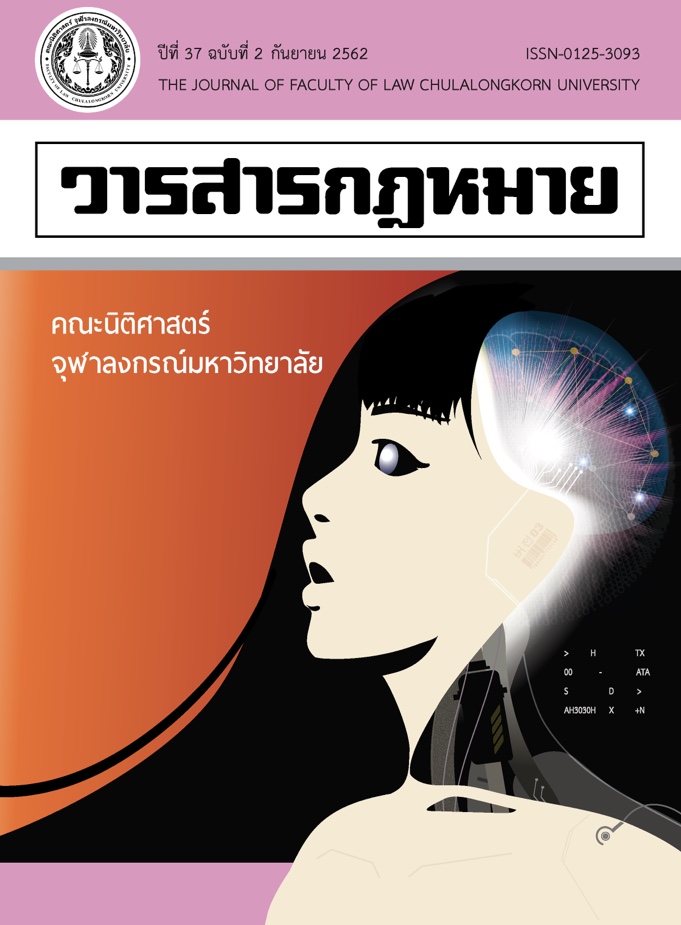หลักสำคัญของกฎหมายวิธีพิจารณาความแพ่งแห่งสาธารณรัฐประชาชนจีน
Main Article Content
บทคัดย่อ
กฎหมายวิธีพิจารณาความแพ่งแห่งสาธารณรัฐประชาชนจีนเป็นกฎหมายที่มีบทบาทสำคัญในการกำหนดวิธีการและกระบวนการพิจารณา เพื่อให้ได้มาและบังคับตามสิ่งที่กฎหมายสารบัญญัติเกี่ยวกับกฎหมายแพ่งได้กำหนดและรับรองไว้ บทความนี้ได้ทำการศึกษาหลักสำคัญของกฎหมายวิธีพิจารณาความแพ่งแห่งสาธารณรัฐประชาชนจีนซึ่งประกอบไปด้วยหลักการทั่วไปของระบบศาลประชาชน หลักกฎหมายพื้นฐาน เขตอำนาจศาล เขตศาล การฟ้องคดี กระบวนพิจารณาโดยทั่วไป และการไกล่เกลี่ย ซึ่งพบว่า ระบบศาลประชาชนและการพิจารณาพิพากษาคดีแพ่งตั้งอยู่บนหลักการของศาลสี่ระดับและระบบการพิจารณาคดีสองศาล ส่วนหลักกฎหมายสำคัญของกฎหมายวิธีพิจารณาความแพ่งจะประกอบไปด้วยหลักการพิจารณาคดีโดยอิสระของศาล หลักการตัดสินคดีโดยยึดข้อเท็จจริงและยึดข้อกฎหมายเป็นเกณฑ์ หลักความเท่าเทียมกันของคู่ความ หลักความซื่อสัตย์และสุจริต ทั้งนี้การฟ้องคดีแพ่งจะยึดหลักเกณฑ์ตั้งต้นที่ว่า โจทก์ต้องทำการยื่นฟ้องคดีไปยังศาลที่จำเลยมีภูมิลำเนาหรือที่จำเลยได้พำนักอาศัยเป็นประจำ โดยกระบวนพิจารณาคดีแพ่งทั่วไปจะกระทำโดยผู้พิพากษาเป็นองค์คณะ พิจารณาคดีโดยเปิดเผย คู่ความมีสิทธิอุทธรณ์คำพิพากษาไปยังศาลที่มีลำดับสูงกว่าศาลที่ทำคำพิพากษาได้อีกหนึ่งครั้ง และกฎหมายยังเปิดโอกาสให้มีการตรวจสอบกระบวนพิจารณาคดีแพ่งจากบุคคล 3 กลุ่ม คือ ศาลประชาชน คู่ความในคดี และอัยการประชาชน นอกจากนี้ยังพบว่า การไกล่เกลี่ยมีบทบาทสำคัญควบคู่ไปกับการดำเนินการพิจารณาคดีโดยปกติ ทั้งยังสามารถกระทำได้ในเกือบทุกช่วงเวลาของกระบวนการพิจารณาคดีความแพ่งด้วย
Article Details
ลิขสิทธิ์และเนื้อหาในเว็บไซต์ของวารสารกฎหมาย (รวมถึง โดยไม่จำกัดเฉพาะ เนื้อหา รหัสคอมพิวเตอร์ งานศิลป์ ภาพถ่าย รูปภาพ ดนตรีกรรม โสตทัศนวัสดุ) เป็นกรรมสิทธิ์ของวารสารกฎหมาย และผู้ได้รับการโอนสิทธิทุกราย
1. วารสารกฎหมาย ให้อนุญาตให้คุณใช้สิทธิอันไม่เฉพาะเจาะจงที่สามารถถูกถอนเมื่อใดก็ได้ โดยไม่มีค่าใช้จ่าย ในการ
- เยี่ยมชมเว็บไซต์และเอกสารในเว็บไซต์นี้ จากคอมพิวเตอร์หรือเครื่องมือสื่อสารผ่านเว็บบราวเซอร์
- คัดลอกและจัดเก็บเว็บไซต์และเอกสารในเว็บไซต์นี้บนลงคอมพิวเตอร์ของคุณผ่านระบบความจำ cache
- สั่งพิมพ์เอกสารจากเว็บไซต์นี้สำหรับการใช้ส่วนตัวของคุณ
- ผลงานที่ได้รับการตีพิมพ์โดยวารสารกฎหมาย จุฬาลงกรณ์มหาวิทยาลัย ถูกคุ้มครองภายใต้ Creative Commons Attribution 4.0 International License ซึ่งอนุญาตให้ทุกคนสามารถคัดลอก แจกจ่าย ดัดแปลง ส่งต่อ ผลงานได้ ก็ต่อเมื่อผลงานและแหล่งข้อมูลได้รับการอ้างอิงอย่างเหมาะสม
2. วารสารกฎหมาย จุฬาลงกรณ์มหาวิทยาลัย สงวนสิทธิ์ไม่อนุญาตให้คุณใช้สิทธิอื่นใดที่เกี่ยวข้องกับเว็บไซต์และเอกสารบนเว็บไซต์นี้ เช่น การคัดลอก ดัดแปลง เปลี่ยนแปลง ส่งต่อ ตีพิมพ์ แจกจ่าย เผยแพร่ จัดแสดงในที่สาธารณะ ไม่ว่าจะในรูปแบบใดก็ตาม ซึ่งเว็บไซต์หรือเอกสารบนเว็บไซต์ โดยไม่อ้างอิงถึงแหล่งข้อมูลหรือโดยไม่ได้รับอนุญาตเป็นลายลักษณ์อักษรจากวารสารกฎหมาย จุฬาลงกรณ์มหาวิทยาลัย
3. คุณอาจขออนุญาตที่จะใช้เอกสารอันมีลิขสิทธิ์บนเว็บไซต์นี้โดยการเขียนอีเมลล์มายัง journal@law.chula.ac.th
4. วารสารกฎหมาย จุฬาลงกรณ์มหาวิทยาลัย เข้มงวดกับการคุ้มครองลิขสิทธิ์อย่างมาก หากวารสารกฎหมาย จุฬาลงกรณ์มหาวิทยาลัยพบว่าคุณได้ใช้เอกสารอันมีลิขสิทธิ์บนเว็บไซต์นี้โดยไม่ถูกต้องตามการอนุญาตให้ใช้สิทธิ ดังที่กล่าวไปข้างต้น วารสารกฎหมาย จุฬาลงกรณ์มหาวิทยาลัยอาจดำเนินคดีตามกฎหมายต่อคุณได้ เพื่อเรียกร้องค่าเสียหายที่เป็นตัวเงินและคำขอชั่วคราวให้คุณหยุดการใช้เอกสารดังกล่าว ทั้งนี้ คุณอาจถูกสั่งให้ชดใช้ค่าใช้จ่ายใดๆ ที่เกี่ยวข้องกับการดำเนินการตามกฎหมายนี้
หากคุณพบเห็นการใช้เอกสารอันมีลิขสิทธิ์ของวารสารกฎหมาย จุฬาลงกรณ์มหาวิทยาลัย ที่ขัดหรืออาจขัดต่อการอนุญาตให้ใช้สิทธิดังที่ได้กล่าวไปข้างต้น โดยเชื่อว่าได้ละเมิดลิขสิทธิ์ของคุณหรือของผู้อื่น สามารถร้องเรียนมาได้ที่ journal@law.chula.ac.th


